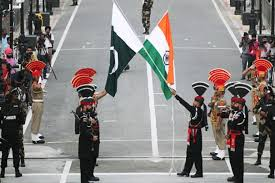"The lack of dialogue (between New Delhi and Islamabad) also gives India the option to continue talking about terrorism to malign Pakistan and thus disaffect Washington towards Pakistan.
The terrorism issue gets highlighted in US- India joint statements, including the latest one after Prime Minister Narendra Modi’s recent visit to the US. India’s role in fighting terrorism, an interest America shares, also enhances India’s value as a US ally," writes Touqir Hussain, a former ambassador, and adjunct professor Georgetown University and Visiting Senior Fellow National University of Singapore.
"India thinks that by revoking its special status, it has made Kashmir an internal matter, thus removing it as a subject of a bilateral agenda with Pakistan and making the dispute a non-issue by depriving Pakistan of the opportunity to advance the cause internationally.
Dialogue with Pakistan would reverse these ‘gains’, as Pakistan would focus on Kashmir at the talks. Dialogue would also attract global media coverage which Pakistan would use to publicise the Kashmir situation.
India feels a muted relationship would help it create new ground realities in Kashmir which Kashmiris and Pakistan might come to accept sooner or later."
Even western world and Russia are keen to woo India:
Pakistan's frustration is understandable. The western democracies are wooing New Delhi for quite sometime now.
Russia has in the past offered a sweetheart deal on cut-price oil when Ukraine sanctions bit in 2022. The feeling is mutual. India’s government cheered when Vladimir Putin won an alleged bogus presidential “election”.
In 2024 London's prestigious newspaper 'The Guardian' which does not quite a record of being BJP or Modi friendly wrote:
"India’s 1.4 billion population – the world’s largest – youthful age profile and expanding economy – the fifth biggest – are turning it into a modern Klondike.
Gold-diggers flock.
All stake a claim for Delhi’s attention, influence, markets, skills and tech.
At least, that’s how the prime minister, Narendra Modi, sees it. His Hindu nationalist devotees believe India, a “civilisational state”, is embarked on a benign global mission as a vishwaguru (teacher to the world) under Modi Baba’s sage, cult-like tutelage."
'The Guardian' was a bit caustic. It noted: "Suddenly, everyone loves India. But it’s an affair, not a marriage.
Whether it lasts depends on the consequences of this week’s watershed election. (204 general election) At stake are the credibility of Indian democracy and, potentially, the country’s future as a cohesive unitary state.
"Courting India as a counterweight to China, the US is ardently pursuing a deeper security relationship. The EU hankers after a free trade pact. Countries ranging from Australia to Norway to the UAE have already forged bespoke deals.
France greedily eyes a growing market for its weapons manufacturers. For Germany, India is an $18bn land of export opportunity. Britain, the former colonial power, is a keen suitor too – though frustratingly for Raj romantics, a post-Brexit tryst is on ice."
The Pakistani expert Hussain tries to analyse things quite candidly:
"India has broken through the South Asian ceiling and acquired a place at the global high table. (this is certainly a big factor - blogger)
"US patronage has no doubt helped in raising its economic weight, military potential, and diplomatic stature. India now wants Pakistan to take cognisance of its status by being haughty, unapproachable, and reluctant to talk.
The trajectory of US-India strategic and economic relations, embracing trade, security, defence and technology cooperation, has been in the ascendant for the past 25 years.
Prime Minister Narendra Modi’s recent visit to Washington and his talks with Donald Trump made their own contribution to advancing the US-India relationship further, especially with America’s offer to sell F-35s, America’s most advanced military aircraft. As the Economist put it, “America is betting on India’s inexorable rise," says Hussain.
"India has come a long way from its embarrassing status as an unconvincing regional power to which its neighbour had the ‘pretensions’ to speak as an ‘equal’.
He also notes: "India feels Pakistan is still living that illusion. Most of Pakistan’s strategic community keeps complaining that Washington is giving “preferential” treatment to India, as if the two relationships served the same or equal purpose and were interchangeable.
The reality is that America’s ties with India and Pakistan are totally different, serving different purposes. Each relationship rose or declined independently, neither limited nor enhanced by the other.
India hopes that the refusal of dialogue would force Pakistan to know its place rather than harbour pretensions of being its rival or competitor."
Indian Foreign Minister S. Jaishankar keeps calling Pakistan “irrelevant”, implying that India does not need Pakistan, which has lost its leverage due to the Afghanistan problem, erosion in its global standing, diminished influence in the Middle East, increased external dependence, and vulnerability to international pressure.
This assessment by India no doubt figured in its calculation that its action on Aug 5, 2019 to rescind Kashmir’s special constitutional status would not evoke a serious international response."
Wrap Up :
The Guardian article had said in 2024 itself:
"The hubris of Subrahmanyam Jaishankar, Modi’s external affairs minister and close confidant, is instructive.
He writes that India’s priorities should be to “engage America, manage China, cultivate Europe, reassure Russia, bring Japan into play, draw neighbours in, extend the neighbourhood and expand traditional constituencies of support”. Jaishankar calls this “multi-alignment”.
ends










No comments:
Post a Comment